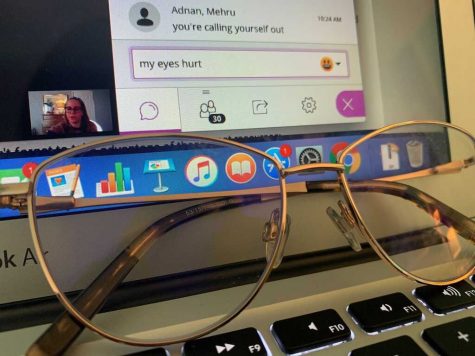The Truth Behind Blue Light Glasses
November 5, 2020
Blue light glasses have taken the world by storm, especially with the sudden transition to online school and working from home. Many people who purchase the glasses simply want to protect their eyes, but most people do not know what blue light glasses actually do.
According to companies that produce blue light glasses, the specs not only protect consumers’ eyes from glare, but also protect their retinas from prolonged exposu

re to blue light. This over-exposure supposedly increases the risks of permanent eye damage and vision loss, however the Harvard Health Blog disputes this claim.
“The amount of blue light from electronic devices, including smartphones, tablets, LCD TVs, and laptop computers, is not harmful to the retina or any other part of the eye.” the Harvard Health Blog said.
The greatest piece of evidence to support this statement is that the sun also releases blue light – over 10 times more than devices do.
“It all comes down to this: consumer electronics are not harmful to the retina because of the amount of light emitted. For example, recent iPhones have a maximum brightness of around 625 candelas per square meter (cd/m2). Brighter still, many retail stores have an ambient illum
ination twice as great. However, these sources pale in comparison to the sun, which yields an ambient illumination more than 10 times greater!” said the Harvard Health Blog.
According to this information, we would already have lasting eye damage from the amount of blue light the sun releases.
What we actually know about blue light glasses is minimal because very little research has been done on them. However, it has been confirmed that the lenses prevent
blue light from affecting sleep cycles. Blue light exposure reduces melatonin production and melatonin is a chemical that helps you sleep. As a result, using electronic devices at night can keep you up. Wearing the glasses helps, but there are ways to stop sleep disruption without blue light glasses, such as putting electronic devices away two to three hours before you go to bed.
People also buy blue light glasses to deter common device usage symptoms like eye strain, eye dryness and headaches, but blue light does not cause these symptoms. They all fall under computer vision syndrome – a group of symptoms related to prolonged device use – and can be stopped in a number of ways such as using eye drops, sitting at an arm’s length (25 inches) away from screens and following the 20-20-20 rule (every 20 minutes, look at something that is 20 feet away for 20 seconds).
This does not mean that blue light glasses are useless or do not do their job; they actually do block blue light. As said earlier, they prevent blue light from ruining your sleep cycle. There is nothing harmful about the glasses and they might even help with computer vision syndrome in the form of a placebo. The only problem is how uninformed and misinformed we are, about both blue light and blue light glasses.


